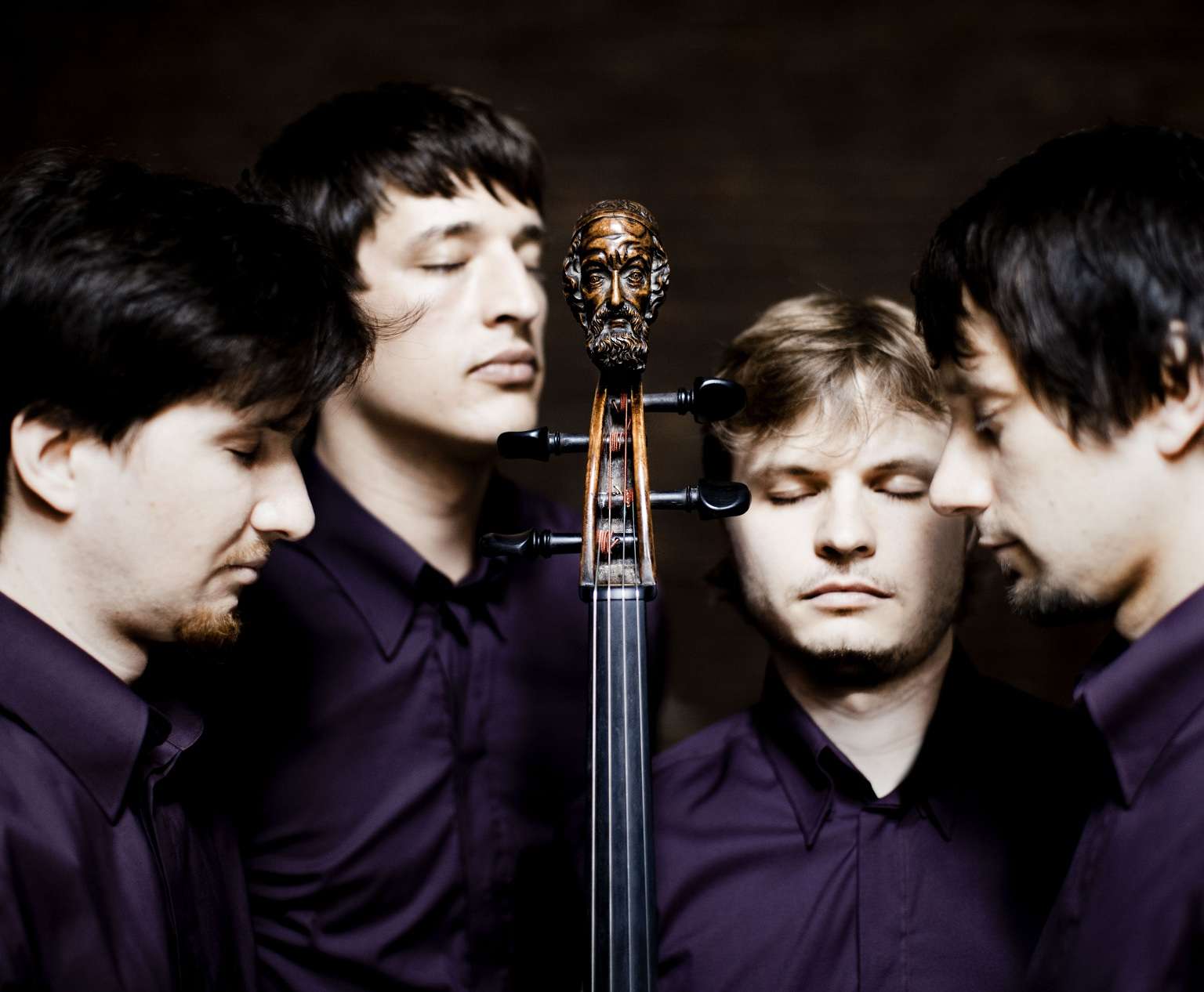|
Back
Emotionalism Redeemed New York
Weill Recital Hall, Carnegie Hall
11/15/2012 -
Josef Haydn: String Quartet in C Major "Emperor", Op. 76, No. 3
Karol Szymanowski: String Quartet No. 1, Op. 37
Josef Suk: Meditation on an Old Czech Hymn, "St. Wenceslas”, Op. 35a
Leos Janácek: String Quartet No. 1, “Kreutzer Sonata”
Apollon Musagète Quartet: Pawel Zalejski, Bartosz Zachlod (Violins), Piotr Szumiel (Viola), Piotr Skweres (Cello)

The Apollon Musagète Quartet (© Marco Borggreve)
After last night’s concert–their very first in the United States–it was obviously that the official Apollon Musagète picture, shown above, is terribly misleading. Unlike that statue-stiff pose, that photographic posturing, these young artists are alive, electric, exciting. Yes, their music has an elegance, but this comes from the sheer beauty which each of the Polish artists have achieved in less than six years.
While the picture is deceptive, their title says it all. The original Stravinsky ballet was about the uniting of all the arts together, and this group does indeed work with singers and other artists. But last night, they were on their own with four Central European works. The music mainly had an eccentricity of style, but nothing was awkward, nothing was out of place, even in the super-elegant confines of Weill Concert Hall.
The one exception to such eccentricity was the opening Haydn “Emperor” Quartet. The Apollon Musagète retained Haydn’s classical workmanship, but it had an emotional vigor, a springiness, even a pictorial feeling.
That first movement was joyous enough, but when cellist Piotr Skweres played the drone of the rural dance, one could almost bop along to the peasant clogs. Of course the variations on what we now feel was the Nazi anthem was nothing of the kind. It was only a birthday gift to an 18th Century Emperor. If one could get overcome that reference, this was a perfect opportunity for Haydn to have respectful fun, and the Apollon Musagète gave it all the moods possible. The finale was martial, percussive, striking as much of Beethoven as of Haydn. The Apollon Musagète gave it the appropriate military strains.
The only work from the quartet’s homeland was Karol Szymanowski’s First Quartet, and while the composer’s output is sometimes questionable, his violin pieces–the Concerto and his two quartets–is ravishing. In fact, when the Apollon Musagète played the second movement, it was a total transformation. Not quite pastoral, not quite a song, not quite as simple as the composer specified, it was a ravishing picture of...well, perhaps a garden or a forest or a walk up the Carpathian Mountains. No birdsong, nothing imitative, just the gentle lush sounds of the quartet at its most beautiful.
After the intermission came a work I had never heard before, Josef Suk’s awkwardly titled Meditation on an Old Czech Hymn, “St. Wenceslas”. Composer Suk was a violinist himself, and this quartet, starting with the old chant (not the Christmas carol!) went into an eight-minute arch which could rival Barber’s more famous Adagio. Not quite a crescendo, the piece was emotionally awesome.
The final work (preceding a jaunty Stravinsky Tango encore) was Leos Janácek “Kreutzer Sonata” Quartet. The Apollon Musagète Quartet didn’t linger over these ever more tragic lines, but played them with a lilt–an ironic lilt. The two violinists, Pawel Zalejski and Bartosz Zachlod, accented those eerie tremelandi, and the other bowing effects so vividly that it became a visceral energy. No other composer wore his heart on his sleeves (or his fiddles) so noticeably as Janácek, and the Apollon Musagète turned that into the most vival energy.
The success came not with those effects, not with those incredible last measures, but with the sheer beauty of the ensemble’s playing. Janácek might have been the unhappy elderly lover here, but he was adorned in the most dazzling clothes. Janácek’s musical mutterings, his outcries, his screams were all the more exciting because the harshness was never exaggerated.
And the Apollon Musagète is so exciting because it is so personal. These four players are splendid in their own right, but they somehow plumb the emotional depths of their composers, ever balancing on the brink of emotional excess, always reedemed by that unparalleled artistry.
Harry Rolnick
|